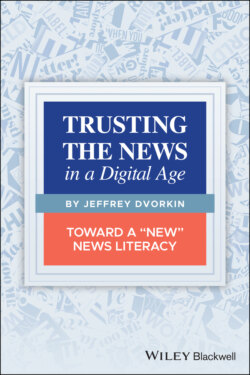Читать книгу Trusting the News in a Digital Age - Jeffrey Dvorkin - Страница 26
We MUST Share and Receive Information
ОглавлениеWe mentioned the motivations of news to “surprise” and “delight.” There is also a universal need to share and receive news simply because it makes us feel empowered and connected to our communities. At a 2018 conference, Facebook's president, Sean Parker, revealed that sharing social media content and clicking on apps causes the brain to release a rush of dopamine – a hormone and neurotransmitter that affects a person’s sense of pleasure and reward. In short, the Internet makes us feel good. In some part, that is what has hooked us on the Internet.
It's not all a deterministic stimulus and response; there is still the “surprise” aspect of news motivation.
The news, especially reliable, trustworthy news, has as its main purpose the goal of acting as an early warning system for the public. This can be everything from a weather forecast to an impending disaster. It can be a newspaper that carries with it an editorial position about a dangerous politician. Or a helpful bit of advice to avoid a traffic jam on a highway on your way home after work.
In this instance, the news can both “surprise” and “delight.” The public consumes the news for the purpose of knowing what is happening around them – in their communities, in their countries, and elsewhere. This connectivity function of the news allows the public to share events and understanding with people to whom they may have had little exposure or knowledge. Do we know what life is like in Yemen? Can we understand the plight of the people there? Why should we know or care? The news – done properly –helps us understand and empathize with the plight of others. It can also serve to illustrate our own plight and condition.
The news is not one single approach or attitude. It tends to provide a palette of ideas, investigations, and entertainments. A mass‐market approach, such as in a daily newspaper or daily broadcast, provides a bit of everything in order to appeal to the broadest (and most lucrative) audience. In the digital age, we are able to specialize in our tastes: one medium for hard news, another for humor, still another for sports and entertainment. A diet of one dish alone may be what some people prefer. Most people prefer a more varied approach.
